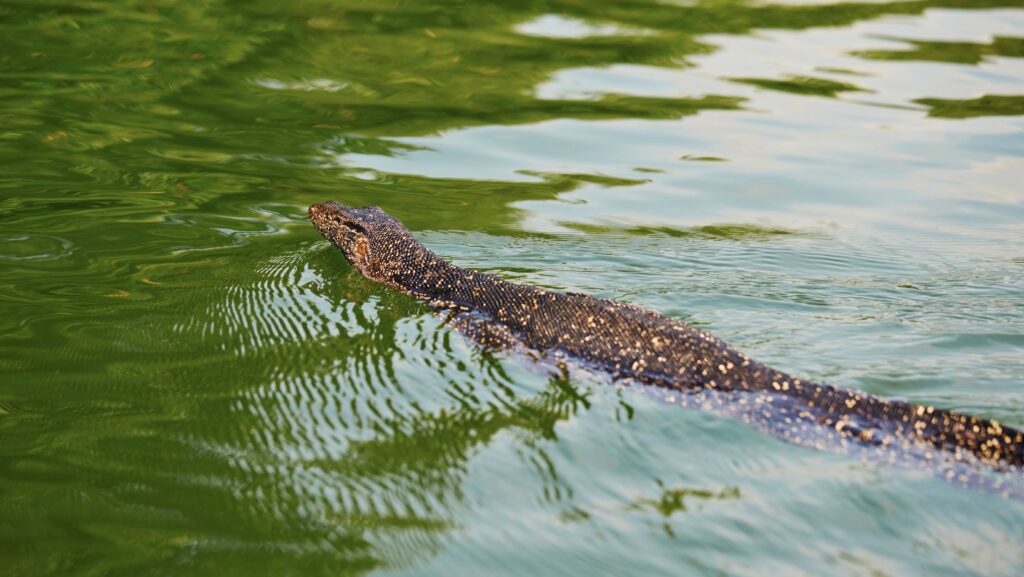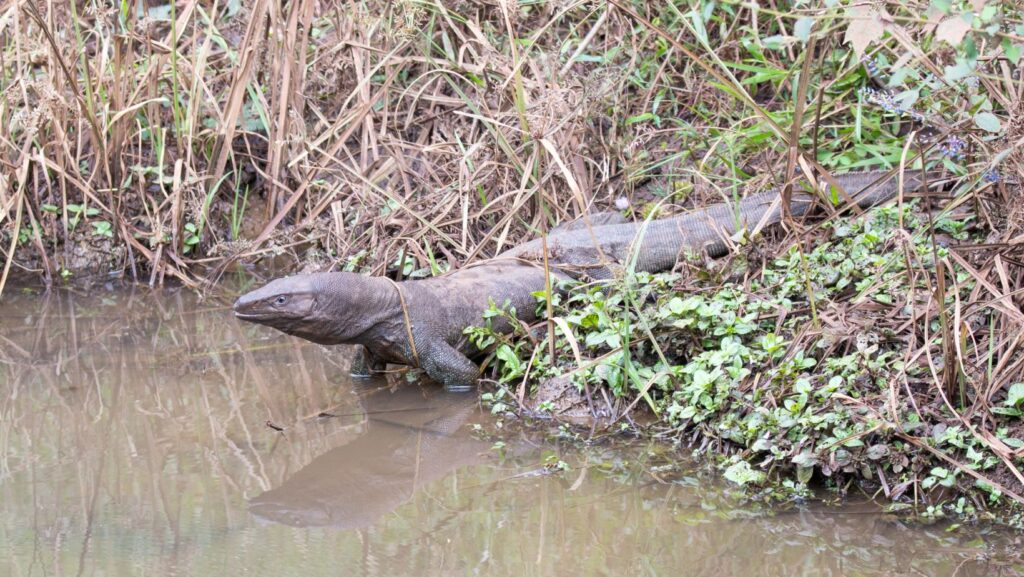Ever seen a lizard drinking water? Wondering how can lizards survive without water? Stay tuned, and you will find answers to your questions soon in this article.
Lizards are fascinating creatures/ annoying reptiles that you often find around. These reptiles are cold-blooded and adapted to living in dry environments. Lizards always have to rely on external sources of heat to regulate their body temperature. Every living being needs water, and lizards are no exception.
However, unlike mammals and other organisms, lizards don’t need water so often, and they can survive without it for long. Lizards are known for their unique adaptations, where they can conserve water and tolerate dehydration. How long a lizard can go without water depends upon a range of factors which we will discuss further in this article.
Join us in this article and make sure you stick to the end to get the most out of it. Here we will explore the fascinating world of lizards. We will specifically dive down into the topic concerning lizards’ ability to survive without water. Let’s start discovering.
Contents
- Do Lizards Need Water To Survive?
- How Much Water Do Lizards Need A Day?
- How Often Do You Give A Lizard Water?
- How Do I Give My Lizard Water? Do Lizards Need Water Bowls?
- How Long Can A Lizard Go Without Drinking Water?
- How Do Lizards Get Water In The Desert?
- Can Lizards Live In Water? Can Lizards Swim In Water?
- But have you ever wondered how lizards swim?
- Can A Lizard Survive Without Eating?
- Lizards Hibernation Without Food And Water
- Wrapping up…
Do Lizards Need Water To Survive?
Yes, every living organism needs water to survive, and lizards are definitely among the lot. Water has always been an essential component for different body functions, be it temperature regulation, respiration, digestion, or more.
Even if lizards do not drink water directly, they need to hydrate their body at regular intervals. However, lizards have the ability to go without water for extended periods and yet stay healthy. They will somehow draw fluid from different sources and thrive before they get water again.

How Much Water Do Lizards Need A Day?
How much water a lizard needs on a daily basis depends upon a range of factors. Lizards need water depending on their environmental conditions, activity level, size, species, and more. For instance, lizards living in humid habitats will require more water, whereas the ones living in arid areas will require less. Desert lizards adapt to live in extremely dry environments, and therefore even with no access to water for long, they survive well.
Not just a few days or weeks, these lizards can make it without water for months. Whereas on the other hand, tropical lizards may need water more frequently, giving to the environmental condition they live in.
Similarly, lizards who live in captivity require more fresh water for their health and well-being. Lizards like chameleons would prefer to drink water from surfaces like rocks and water, whereas some choose to do it from a dish.
For lizards in captivity, it is important to choose water dishes as per the lizards’ size and need. And most importantly, the water must be changed regularly (almost daily) in order to prevent the buildup of harmful bacteria.
Pet lovers who have kept lizards should know that dehydration can be a serious health concern for these reptiles. If your pet lizard is showing symptoms like lethargy, sunken eyes, and wrinkled skin, it may be dealing with dehydration. In situations like these, provide the lizard with fresh water immediately and consult with a veterinarian for safety.
How Often Do You Give A Lizard Water?
For lizards in captivity, it is important to give fresh water daily. A little water will be enough; however, it must be changed regularly to prevent bacteria buildup. You can either give lizards water in a small bowl or through leave surface, in small ponds, stone holes, etc.
How often you should give water to lizards in captivity should also depend upon their size and species. In addition, lizards’ activity level and environmental conditions too play an important role in deciding the frequency.
Lizards, including Desert Horned Lizards, Zebra-tailed Lizards, and Collared Lizards, require water less frequently. Whereas Iguanas, Chameleons, and Dragon Lizards will require extra water that too more frequently.

How Do I Give My Lizard Water? Do Lizards Need Water Bowls?
The way you provide water to your lizard depends upon its species and individual preference. Water is essential for your lizards’ health and well-being, and therefore you should never overlook its importance. One of the most common and easy ways to offer water to your pet lizard is in a large bowl.
Place the bowl on a surface where the lizard can comfortably reach it. The large water bowl should be big enough for the lizard to climb and drink comfortably. However, it shouldn’t be deep enough to pose a risk of drowning. Also, make sure you change the water in the bowl almost daily.
Besides that, do clean the bowl often in between. Pet owners who have lizards like bearded dragons can also provide them with a small pool where the reptile can soak and enjoy. Such enclosures are beneficial for their health and well-being.
Or, with other lizards, you can use a spray bottle or a mister to ensure the reptile is hydrated all way long. This method is ideal for lizards who do not prefer drinking water from a bowl but from leaves and other such surfaces.
It is also an ideal method if water bowls have been accidental for you before. The idea of using a spray bottle or mister is to maintain the humidity level in the reptiles’ enclosure.
How Long Can A Lizard Go Without Drinking Water?
Lizards can go without drinking water for a few to several days. Lizards are reptiles who can conserve water quite well and therefore don’t require drinking it every other day. However, how long depends upon the lizard’s size, species, and activity level, along with the temperature and humidity of its environment.
For example, lizards like bearded dragons and Gila monsters obtain moisture from their food. They burrow underground to escape the heat of the day and can make it without water for several weeks. At the same time, the ones that are habitual of managing in a humid area will not be able to make like them.
Also, do remember that water scarcity amongst lizards can lead to dehydration. And prolonged dehydration can result in organ damage and sometimes even death. Therefore, no matter whether in captivity or wild, lizards should have access to fresh water all the time.
How Do Lizards Get Water In The Desert?
The lizards who survive in the wild or desert are capable of finding water for their requirement. Water is a crucial survival resource, and lizards living in deserts obtain it from:
- Drinking: Desert lizards will drink water from anywhere possible, be it rocks or other crevices, dew formed on rocks and plants overnight, rainwater that has pooled in natural depressions in the ground, or small pools.
- Food: When not via regular sources, desert lizards source enough water from their food. Lizards can extract water from insects, fruits, and succulent plants as they digest these food items.
- Metabolic water: Lizards can conserve water by reducing their respiratory water loss or by excreting a concentrated form of urine. These reptiles, like any other animals, know the art of producing water as a byproduct of their metabolic processes.
- Burrowing: When desert lizards find it difficult to access water, they will burrow into the ground to escape the heat and conserve moisture. The cooler, moister soil underneath helps them provide a source of water that they can absorb through their skin and stay hydrated.
In short, desert lizards have evolved a variety of strategies, and even when there is less water, they can cope with the environment. Their physical nature helps them survive in harsh conditions and adapt accordingly.

Can Lizards Live In Water? Can Lizards Swim In Water?
Yes, lizards can survive in water, ideally Aquatic lizards. In fact, the Marine iguana is the (only) lizard that can spend time in the ocean.
Several species of aquatic lizards can live in water and, in fact, swim efficiently.
Water dragons, in fact, are one among the lot that can adapt to different aquatic habitats, including lakes, ponds, rivers, streams, etc.
But have you ever wondered how lizards swim?
Well, many aquatic lizards have a flattened, streamlined body shape. It is their body type that helps them in moving through the water efficiently as if they are swimming.
Or some aquatic lizards also have webbed feet, which help them in paddling through the water. Aquatic lizards are known for their ability to hold their breath for a long time underwater. This combination of survival and undulating their bodies, and paddling makes them efficient swimmers.
Some of the most common aquatic lizards include the water dragon, the basilisk lizard, and the green iguana. However, one should know that not all lizards can adapt to water, and many of them will drown and die easily.
Can A Lizard Survive Without Eating?
As much as water is a necessity for living being, food is as well, and Lizards are no exception. All animals require food for energy and important nutrients that help them survive.
However, just like some lizards can make it for a long without water, they can do it without food as well. But at the same time, it is important to learn that eating is essential and prolonged starvation can have serious consequences on lizards’ health.
How long lizards can go without food depends upon their species, size, age, health, and environmental conditions. Small lizards will require food more frequently than larger lizards. Large lizards have more fat stores and go without food for longer. But lizards who fail to get enough nutrients from their diet become more susceptible to disease and parasitic infections.

Lizards Hibernation Without Food And Water
How Long Can A House Lizard Live Without Food And Water? Well, Some species of lizards may enter a state of brumation during the winter months. Brumation in lizards is similar to hibernation in mammals. As a lizard enter brumation, its metabolic rate slows down, which helps in going without eating and drinking for long.
However, not all lizards can go into brumation. For example, House lizards, also known as common house geckos, are not known to undergo brumation. These lizards adapt to survive in a variety of environments and can even manage to go for long without food and water. However, since they are, they are adapted to living in warm, tropical environments, and food is easily available to them; therefore, they stay active year-round.
But house lizards can conserve energy and water quite efficiently and thus can go without food for a few days to several weeks. But in order to prevent dehydration, they do need fresh water access every time. Also, despite how long they can survive without food, deprivation isn’t advisable. Providing them with a balanced and nutritious diet is good for their physical health and well-being.
Wrapping up…
Overall, lizards need water to survive; however, they can make it without it for long, maybe days and weeks. However, how long a lizard can live without water depends upon their species majorly. Some species have unique adaptations to conserve water and tolerate dehydration, and they can go without water for months as well. But not all of them are the same, and some lizards need their daily dose of water even if they soak in it or drink a drop.
